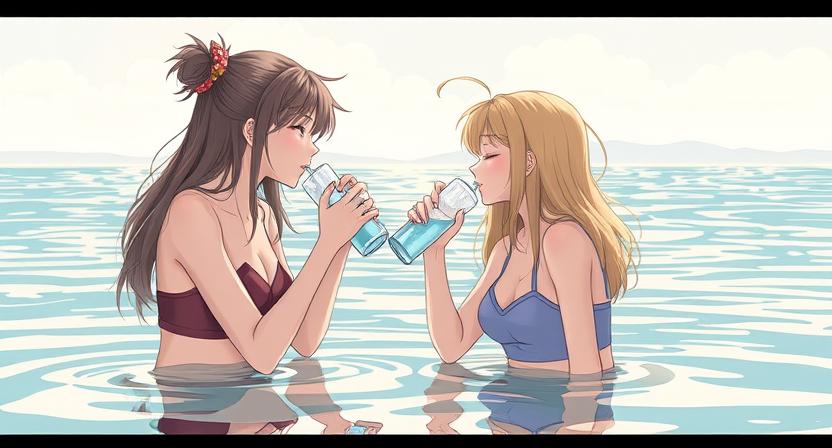
Water is essential to life. It makes up about 60% of our bodies and plays a vital role in nearly every biological function. From regulating temperature to flushing out toxins, water is a key player in keeping us alive and well. But what happens if you just drink water—and nothing else?
This question has gained popularity with the rise of extreme fasting trends, detox challenges, and minimalist health routines. Some people believe that drinking only water for an extended period can detoxify the body, promote weight loss, or even “reset” the system. But what happens if you only drink water and no food? Is it safe? Sustainable? Scientifically sound?
In this blog, we break down the physiological effects, risks, and potential outcomes of living on water alone.

What Happens If You Just Drink Water for One Day?
If you’re only drinking water and skipping food for a single day, your body likely won’t experience major harm—especially if you’re generally healthy. In fact, short-term fasting (like intermittent fasting) has been studied for its potential benefits, including:
-
Improved blood sugar control
-
Lower insulin levels
-
Increased fat burning
-
Cellular repair processes like autophagy
However, these benefits are typically seen in planned, well-monitored fasting regimens—not in random water-only fasts without preparation or medical oversight.
What Happens If You Only Drink Water and No Food for Longer?
Now, let’s look at what happens if you only drink water and no food for a longer stretch—several days or even weeks. The body undergoes several stages when deprived of food:
Stage 1: Glycogen Depletion (0–24 hours)
Your body first turns to stored glucose (glycogen) in the liver and muscles for energy. This usually lasts for about 24 hours.
Stage 2: Ketosis (2–3 days)
Once glycogen runs out, your body begins breaking down fat for fuel, producing ketones. This is called ketosis. During this time, you might feel fatigue, dizziness, headaches, or irritability.
Stage 3: Muscle Breakdown (after 3–5 days)
After several days of fasting, your body starts breaking down protein (muscle tissue) to create glucose for organs that can’t use ketones (like parts of your brain). You may experience muscle weakness, brain fog, and significant fatigue.
Stage 4: Starvation (1–2 weeks+)
Prolonged fasting enters dangerous territory. Without vitamins, minerals, and calories, the body becomes malnourished. Eventually, vital organs begin to shut down, and the risk of death increases.
Health Risks of Drinking Only Water Without Food
1. Malnutrition
Your body needs a wide range of nutrients—protein, fats, carbs, vitamins, and minerals. Water alone cannot provide this. After a few days, you begin experiencing nutritional deficiencies that can affect everything from energy to immune function.
2. Electrolyte Imbalance
Electrolytes like sodium, potassium, and magnesium help your muscles and heart function properly. Drinking only water without food can dilute these electrolytes, leading to conditions like hyponatremia, which can be fatal.
3. Loss of Muscle Mass
Without adequate protein, your body breaks down muscle to meet its energy needs. This can weaken the heart, lower metabolism, and reduce mobility.
4. Organ Damage
Prolonged starvation can damage your liver, kidneys, and heart. Dehydration can also occur paradoxically if water intake is not sufficient or is improperly balanced.
5. Mental Health Effects
Starving the body impacts brain chemistry. Mood swings, depression, anxiety, and cognitive decline can set in after days or weeks of eating nothing.
Are There Any Benefits to Water-Only Fasting?
Some advocates of water fasting claim it can:
-
Promote weight loss
-
Stimulate autophagy (cell cleaning process)
-
Reduce inflammation
-
Lower blood pressure
While early-stage research suggests these effects may occur in controlled environments (under medical supervision), the risks of unsupervised fasting outweigh the benefits for most people. It’s not a sustainable or safe long-term solution.
Real-World Examples: How Long Can You Survive on Water Alone?
On average, a person can survive about 30 to 40 days without food if they have access to water. However, this heavily depends on body fat, baseline health, environment, and hydration levels. Famous hunger strikes and starvation studies show that the body begins to shut down after 3–4 weeks of zero caloric intake.
Most people will begin to experience serious symptoms—dizziness, weakness, fainting, and confusion—after just 3–5 days.
What Should You Do Instead?
If your goal is to lose weight, reset your digestion, or detoxify, there are safer and more effective options than drinking only water:
-
Try intermittent fasting (e.g., 16:8 schedule)
-
Eat whole foods rich in fiber, lean protein, and healthy fats
-
Drink plenty of water, but in conjunction with a balanced diet
-
Consult with a nutritionist or doctor before starting any fasting regimen
The Bottom Line
So, what happens if you just drink water? In short, your body initially adapts by using stored energy and entering ketosis. But beyond a few days, things can get dangerous. Nutritional deficiencies, muscle loss, and organ damage become real threats.
And what happens if you only drink water and no food for weeks? You enter starvation mode. While your body may survive for a limited time, it won’t thrive—and long-term fasting without food can lead to irreversible damage or even death.
Water is essential, but it’s not enough on its own to sustain life. Use it wisely, in combination with balanced nutrition and medical guidance, to support your health safely.







